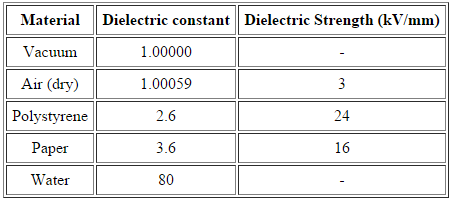Class 12 Exam > Class 12 Questions > What is dielectric strength?
Start Learning for Free
What is dielectric strength?
Most Upvoted Answer
What is dielectric strength?
Dielectric Strength
For an insulating material, the dielectric strength is that ,without breaking down maximum electric field strength that it can withstand intrinsically, that is, without experiencing failure of its insulating properties is known as Dielectric Strength.

Community Answer
What is dielectric strength?
The dielectric strength of a material is a measure of the electrical strength of an insulator. It is defined as the maximum voltage required to produce a dielectric breakdown through the material and is expressed in terms of Volts per unit thickness. The higher the dielectric strength of a material the better an electrical insulator it makes.

|
Explore Courses for Class 12 exam
|

|
Similar Class 12 Doubts
What is dielectric strength?
Question Description
What is dielectric strength? for Class 12 2025 is part of Class 12 preparation. The Question and answers have been prepared according to the Class 12 exam syllabus. Information about What is dielectric strength? covers all topics & solutions for Class 12 2025 Exam. Find important definitions, questions, meanings, examples, exercises and tests below for What is dielectric strength?.
What is dielectric strength? for Class 12 2025 is part of Class 12 preparation. The Question and answers have been prepared according to the Class 12 exam syllabus. Information about What is dielectric strength? covers all topics & solutions for Class 12 2025 Exam. Find important definitions, questions, meanings, examples, exercises and tests below for What is dielectric strength?.
Solutions for What is dielectric strength? in English & in Hindi are available as part of our courses for Class 12.
Download more important topics, notes, lectures and mock test series for Class 12 Exam by signing up for free.
Here you can find the meaning of What is dielectric strength? defined & explained in the simplest way possible. Besides giving the explanation of
What is dielectric strength?, a detailed solution for What is dielectric strength? has been provided alongside types of What is dielectric strength? theory, EduRev gives you an
ample number of questions to practice What is dielectric strength? tests, examples and also practice Class 12 tests.

|
Explore Courses for Class 12 exam
|

|
Signup for Free!
Signup to see your scores go up within 7 days! Learn & Practice with 1000+ FREE Notes, Videos & Tests.



















